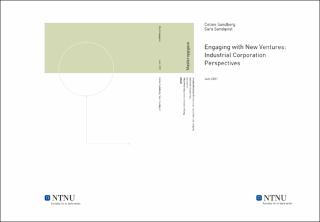| dc.contributor.advisor | Aaboen, Lise | |
| dc.contributor.author | Sandberg, Celine | |
| dc.contributor.author | Sundqvist, Sara | |
| dc.date.accessioned | 2021-10-08T17:19:12Z | |
| dc.date.available | 2021-10-08T17:19:12Z | |
| dc.date.issued | 2021 | |
| dc.identifier | no.ntnu:inspera:85352649:85365372 | |
| dc.identifier.uri | https://hdl.handle.net/11250/2788800 | |
| dc.description.abstract | Dette er en kvalitativ studie som tar for seg samarbeid mellom etablerte industriselskaper og nyetablerte selskaper. Formålet med denne studien er å besvare hvordan etablerte aktører påvirkes til å enten delta eller avvise et pilotprosjekt, og tar høyde for å undersøke hvilke motivasjonsdrivere og hvilke barrierer som oppstår for det etablerte industriselskapet og de nyetablerte selskapene
For å kunne svare på problemstillingen, og for å få mest mulig forståelse for fenomenet og tematikken, har vi brukt et bredt utvalg av eksisterende litteratur. Vi har brukt litteratur om ulike samarbeidsformer, pilotprosjekter og motivasjonsmekanismer i samarbeidet mellom etablerte industriselskaper og nyetablerte selskaper. Vi har utført en kvalitativ studie med dybdeintervjuer som datainnsamlingsmetode. Forskningsdesignet vi har benyttet er en små-N-studie, hvor vi har tatt utgangspunkt i seks informanter fra ulike kontekster med erfaring på tematikken. Forskningsprosessen har vært abduktiv hvor vi dynamisk har beveget oss fra litteratur til data og motsatt.
I denne studien finner vi at hovedmotivasjonen til etablerte industriselskaper for å gjennomføre et pilotprosjekt med nyetablerte selskaper er å øke sin egen verdi og konkurransefortrinn. Gjennom å samarbeide med nyetablerte selskaper får de etablerte industriselskapene tilgang til ny teknologi, og pilotprosjekter fungerer som en lite ressurskrevende metode for å teste teknologien. Videre viser denne studien at etablerte industriselskaper godtar høy risiko ved pilotprosjekter, både teknologisk og organisatorisk, fordi den potensielle risikoen ved å gå glipp av innovasjon ansees som større.
Et nyetablert selskap manglende ressurser og historikk som organisasjon er en barriere for å skulle inngå en avtale eller kjøp. Etablerte industriselskaper vil derfor evaluere oppstarten ut fra hvor kompetente de fremstår og hvorvidt andre aktører gir det nyetablerte selskapet en referanse eller legitimitet. Gjennomføringen av et pilotprosjekt fungerer derfor også som et evaluerende tiltak hvor det etablerte industriselskapet får mer innsikt i det nyetablerte selskapet som organisasjon for å avgjøre videre samarbeid. | |
| dc.description.abstract | This thesis is a qualitative study that examines collaborations between start-up companies and established industrial companies. The purpose of this thesis is to investigate how established actors are influenced to either participate or reject a pilot project and consider the factors that motivate this and the barriers that arise.
To answer the problem and gain the most robust understanding of the phenomenon and the theme, we have used a wide selection of existing literature. We have used literature on various forms of collaborations, pilot projects and motivational mechanisms in such partnerships. Furthermore, we have included literature on new ventures as suppliers and collaboration between new ventures and established ventures. We have conducted a qualitative study with in-depth interviews as a data collection method. The research design we have used is a small-N study, based on six informants from different contexts with experience in the subject. The research process has been abductive where we have dynamically moved from literature to data and vice versa.
This study finds that the primary motivation for established ventures to carry out a pilot project with new ventures is mainly to increase their value and competitive advantage. Through collaboration with start-up companies, they gain access to new technology, and pilot projects act as a resource-intensive method of testing the technology. Furthermore, this study shows that the established venture accepts high risk in pilot projects, both technologically and organizationally, because the potential risk of missing out on innovation is more significant.
A new venture is lacking resources and history as an organisation is a barrier to entering into any agreement or purchase. Therefore, the established ventures will assess the new venture based on how competent they appear and whether other parties support the new venture. Thus, implementing a pilot project also functions as an evaluative measure. As a result, the established venture gains more insight into the new venture as an organisation, which they use to decide further cooperation. | |
| dc.language | nob | |
| dc.publisher | NTNU | |
| dc.title | Engaging with New Ventures: Industrial Corporation Perspectives | |
| dc.type | Master thesis | |
